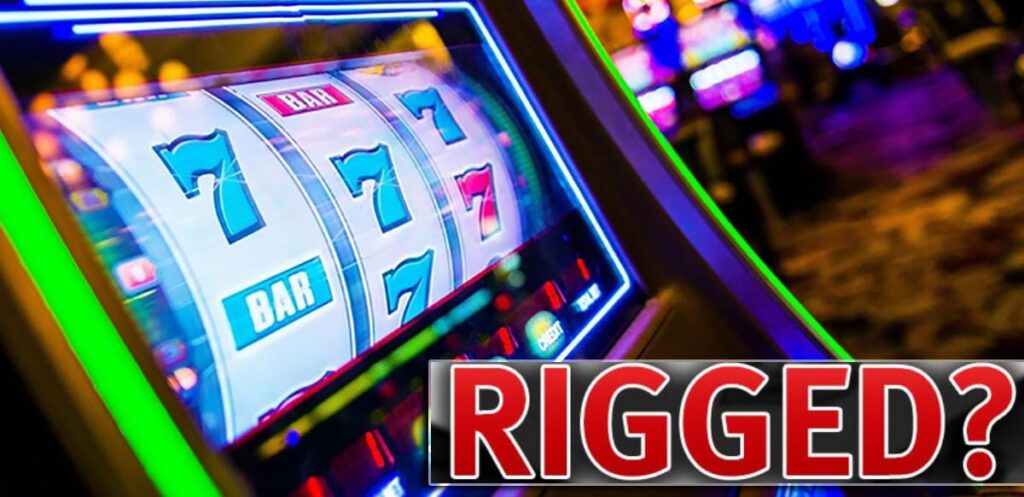When it comes to online slots, one of the most common questions that newcomers ask is whether these games are rigged or not. Understanding this concept is crucial for anyone looking to play responsibly and enjoyably. In this section, we’ll break down the basic elements surrounding the fairness of online slots and help you grasp if you can truly trust the games.
1. What Does “Rigged” Mean?
Before we dive into the details, it’s important to clarify what we mean by “rigged.” In the context of gambling, a game is considered rigged if it is intentionally manipulated to ensure that players cannot win or that the operator has an unfair advantage. This raises questions about the integrity and fairness of the gaming experience.
2. The Role of Random Number Generators (RNGs)
At the heart of online slots is the Random Number Generator, or RNG. This technology is designed to produce random outcomes for each spin, ensuring that every player has an equal chance of winning at any given time. Here’s how it works:
- Randomization: RNGs are programmed to provide a wide range of outcomes, making results unpredictable.
- Independence: Each spin operates independently from the last, meaning past results do not affect future ones.
- Fair Play: If an online casino is licensed and regulated, they are required to use RNGs to ensure fairness.
3. Licensing and Regulation
While we won’t dive deep into this topic (as that will be covered in the next section), it’s essential to mention that reputable online casinos operate under strict regulations. Licensing authorities require them to adhere to fair gaming practices, including the use of RNGs.
4. Common Misconceptions About Online Slots
There are several myths surrounding online slots that can confuse players:
- The “Hot” and “Cold” Machines: Some players believe certain machines are “hot” and likely to pay out, while others are “cold” and won’t. In reality, each spin is random, and previous results don’t factor into future outcomes.
- Slots Are Rigged Against Players: A common fear is that online slots are inherently unfair. While casinos do have a house edge, which is built into slot games, this does not mean they are rigged. The house edge is a normal part of casino games and does not imply cheating.
5. Why Trust in Online Slots?
Ultimately, many players enjoy a fair and engaging experience with online slots. When you choose a licensed and reputable online casino, you can trust that:
- Your games are powered by trustworthy RNG technology.
- Your odds of winning are fair and regulated.
- Accountability and transparency are upheld by the governing bodies of the casino.
Understanding these fundamentals will help you navigate the world of online slots with more confidence. In the next part of our article, we will explore the importance of fair play and licensing to ensure you’re playing safely and responsibly.

Fair Play & Licensing
When it comes to playing online slots, one of the most important factors to consider is whether the games are fair and regulated. This is where the concepts of fair play and licensing come into play. Let’s break this down into simple, easy-to-understand segments.
What is Fair Play?
Fair play means that all players have an equal chance of winning and that the outcomes of games are not manipulated. In the context of online slots, this is ensured through the following:
- Random Number Generators (RNG): The heart of every online slot game is the Random Number Generator, a software program that produces random outcomes for each spin. This ensures that results are unpredictable and fair.
- Return to Player (RTP) Ratio: This percentage indicates how much money a slot machine returns to players over time. A higher RTP means better chances for players. Most reputable online slots have RTPs ranging from 90% to 98%.
Importance of Licensing
Licensing is crucial for ensuring that an online casino operates within the law and adheres to strict regulations. Here’s why you should always check for a license before playing:
- Regulated Environment: Licensed casinos are held accountable by gambling authorities, which means they must follow rules and regulations designed to protect players.
- Auditing: Many licensed casinos undergo routine audits by independent organizations that verify the fairness of games and the integrity of the RNG.
- Consumer Protection: Licensing bodies offer a layer of protection for players, ensuring that they can report unfair practices and have mechanisms for dispute resolution.
How to Check for Licensing
Before you start spinning those reels, here’s a simple checklist to verify the licensing of an online casino:
- Look for a banner, usually at the bottom of the casino’s homepage, displaying their license number and the name of the regulatory body.
- Visit the website of the licensing authority to confirm that the casino’s license is valid.
- Read reviews or check forums to see if other players have had positive or negative experiences with the casino.
In summary, understanding fair play and licensing is essential for a positive online slots experience. Always seek out casinos that are regulated and transparent, so you can enjoy your gaming with peace of mind.
How to Play Safely
When it comes to playing online slots, safety should always be your top priority. Ensuring that you engage in a safe, secure, and responsible gaming experience is essential for both enjoyment and peace of mind. Here are some simple steps to help you play safely.
1. Choose Reputable Online Casinos
Your first step in playing safely is selecting a trustworthy online casino. Look for the following signs of credibility:
- Licensing: Check if the casino is licensed and regulated by a recognized authority. This information is usually found at the bottom of the website.
- Reputation: Research reviews and ratings from other players. This can provide insight into their experiences.
- Secure Transactions: Ensure that the casino uses encryption technology to protect your personal and financial information.
2. Set a Budget
Establishing a budget before you start playing is crucial. Here’s how to do it effectively:
- Determine How Much to Spend: Decide on an amount you can afford to lose without impacting your financial situation.
- Stick to Your Budget: Once you’ve set your budget, do not exceed it. This helps you control your spending.
3. Take Advantage of Bonuses Wisely
Online casinos often offer bonuses and promotions, which can be appealing. However, it’s important to read the terms and conditions:
- Wagering Requirements: Understand how much you need to bet before you can withdraw any bonus winnings.
- Expiration Dates: Be aware of any time limits on how long you can use your bonus.
4. Play Responsibly
Responsible gaming means knowing your limits and playing for fun rather than for financial gain. Here are some tips:
- Take Breaks: Taking regular breaks helps to keep your gaming experience enjoyable and prevents fatigue.
- Know When to Stop: If you find yourself chasing losses or playing for extended periods, it may be time to step back.
5. Use Account Limits
Many online casinos allow you to set account limits on your deposits, losses, and playtime. This can be an effective way to regulate your gaming:
- Deposit Limits: Control how much money you can add to your account within a certain period.
- Loss Limits: Set a maximum amount you’re willing to lose, which can help prevent excessive gambling.
6. Know the Signs of Problem Gambling
Being aware of the signs of problem gambling can help you maintain a healthy relationship with gaming. Signs include:
- Feeling anxious or stressed about your gambling habits.
- Hiding your gambling activities from family and friends.
- Using gambling as a way to escape from other life issues.
If you notice these signs in yourself, it might be a good idea to seek help from professionals or support groups.
By following these steps, you’ll be well on your way to enjoying online slots while keeping your experience safe and responsible. Remember, the goal is to have fun, so play smart!
